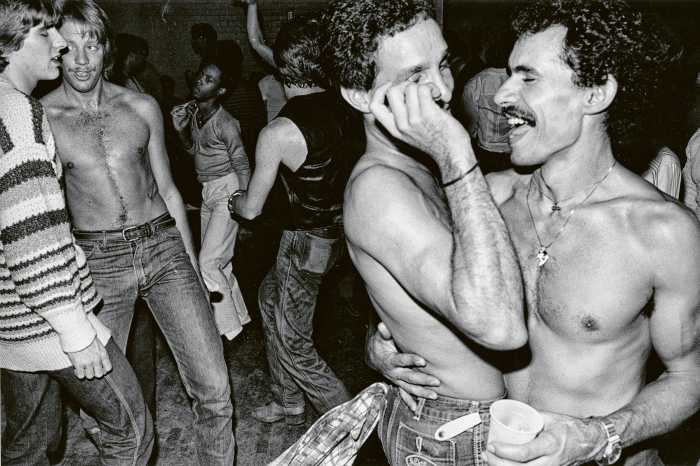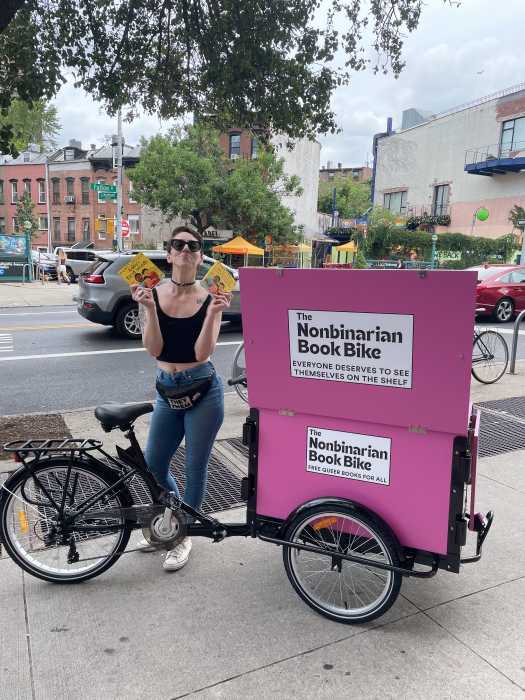BY DAVID NOH | I have never told an interviewee, “I’m grateful that you’re alive,” but that’s exactly what I did when I met writer Alan Hollinghurst at the Helmsley Hotel. His new novel, “The Stranger’s Child,” is his fifth, and I feel that I’ve grown up with him through all of them, every one of which has been marked by his pellucid gay sensibility, radiantly expressive prose, breathtaking turns of phrase and observations, and wonderfully pointed wit.
“The Stranger’s Child” comes at you in sections, following characters in five different eras, all of them haunted by the charismatic Rupert Brooke-like poet, Cecil Valance, who died in World War I but left a lasting legacy of undyingly popular work, however second-rate.
I attended Hollinghurst’s reading at the 92nd Street Y in late October, where he was introduced by an admiring Edmund White, who read a passage –– and kept amusingly mispronouncing Cecil as “Ceesul,” instead of the proper British “Sessil.”
Hollinghurst also read, and proved himself to the drama born, with his sonorous voice, obviously tickled by the naughty passage in which a young character tries, in closeted 1967, to find erotic gay clues in the classified ads at the back of the arcane magazine Films and Filming:
“The Personals were the climax of his solitary ritual, the words themselves bulging and bending with outrageous meaning: ‘Undisciplined bachelor (32) would like to meet strong-minded person with modern outlook.’… It was 6d a word, but some people went on as garrulously as any tapesponder: ‘Motorcyclist, 30, but still a novice, seeks further instruction and would also particularly like to contact a qualified watersports trainer. North London/ Hertfordshire area preferred.’ Paul read all this with a beating pulse, smiling narrowly, in a sustained state of fascinated shock. Only one man seemed to have completely missed the point, and asked to meet a girl with an interest in gardening.”
In person, Hollinghurst was nothing like the daunting presence his mind and eminence would suggest, being terrifically candid and funny, although shaking his head a bit at the hotel’s $30 tab for two cups of coffee and some water. (Welcome to New York!)
DAVID NOH: What was the impetus for “The Stranger’s Child”?
ALAN HOLLINGHURST: All sorts of things. With my books, there tend to be several currents crossing each other and lots of ideas. One of the things was the Great War. I wanted to write something about it, but not have actual war in it, something more domestic. I’m reminded of the famous English queen [actor Ernest Thesiger], who, in the aftermath of having been in the trenches, said, “My dear! The noise! And the people!” [Laughs.]
I was interested in having gaps in the narrative, like in “The Line of Beauty,” jumping from 1983, when Nick is starting off on his first love affair, to 1986, when he’s in the middle of a love affair with somebody else who seems quite unattainable. Giving the reader that disconcerting jolt seems a nice way of dramatizing these kinds of shocks, and I thought I could do something where we met people before the War and join them some time afterwards.
And there was always going to be a gay strand in it, something about evolving gay history and what could be said about relationships between men at different periods, and how that evolved. Different epochs and legal situations could be quite interesting, and then to weave in the question of the reputation of a writer who died young, which is always interesting, wondering what they might have written as opposed to what they really were, which actually could be rather different.
Like in the case of Rupert Brooke, whom I had very much in mind –– the vested interest a lot of people felt in maintaining that image for decades after his death, with the dominant mother who controls what was written about the dead son and the other friend who felt protective of the legacy. It wasn’t until the 1990s that books were written about the violent sexual episodes he had with other men. It was a very long protracted process, the emergence of the truth. I’m sort of rambling on about your question.
DN: Brooke is this legendary figure in England that many Americans aren’t aware of.
AH: He was immensely popular, but he’s not much good, really, that’s the other thing. My mother loved Brooke, and I have couplets by him woven into my childhood. He wrote very patriotic, nostalgic poems, some of them quite grand, but it was Wilfred Owen, who did the radical thing by describing what actually happened in the trenches, cutting through all the old-fashioned rhetoric and telling it like it was.
As for those sexual episodes, there’s an extraordinary letter written to James Strachey, the younger brother of Lytton, who was madly in love with Brooke, and was obviously dying to have a violent sexual episode with him. [Laughs.] Brooke tormentingly writes this long description, apparently about something with another man.
DN: This book was almost like a very smart detective novel, because every time you finish with an era and take up a new one, we’re left rather frustrated to take our leave of the characters, and then must wait for the clue as to who’s who in the next section, because people get married and names change, etc. Like a murder mystery, with live people.
AH: Exactly. I had fun, withholding the slow disclosure of little facts while the reader struggles to get there and find their feet. Like the beginning of the second section and also the third, where Daphne, whom we’ve been rather intimate with, has changed her name, and the reader simply won’t know.
DN: You almost needed one of those fancy family trees to figure it out.
AH: Yes. When I went up to Oxford, I made all these friends whose parents had been married several times, with a bewildering labyrinth of half-brothers and sisters, and never totally getting it sorted out myself. That’s why I put in a few jokes where Daphne says, “This half-brother’s cousin of mine’s uncle.” Some people got rather cross about it, trying to figure out how these people were related to each other, but I thought it was obviously a joke.
When my publisher first read the book, he came out to my flat with a beautiful family tree he had made. He wanted to assure himself that it was all worked out.
DN: How long did it take you to write this? There was quite a time gap since “The Line of Beauty.”
AH: Yes, a bigger gap than usual. The actual writing was about four years. It grew a lot in the execution, something that tends to happen to me. I got the idea to have five sections. I’ll have quite a clear plan for a book, but once I get going, discover more interest in the characters and situations, which alters a 250-page book I might have written. But I don’t mind being expansive.
It was quite a long slog, I must say. The whole quality about writing a book that takes a long time is that it’s very fascinating starting it and sort of an exhilarating relief finishing with it, but there can be a period in the middle where you feel a very long way from either end.
DN: This is something of a new style for you –– whom I’ve always associated with such direct openness –– this withholding of information for the reader. I liked that a lot.
AH: I’m glad you did. It did seem a sort of a departure. I wanted to put the reader on the same footing as a lot of the characters in the book, not quite sure about what happens to people as time goes by and memory changes things.
I suppose I’m suggesting that all memoirs are likely to have a strong element of fiction. It’s very hard to remember more than a few words exactly of what someone said to you last week, much less 50 years ago. Unless you keep a diary, but even then, the diary is changing the material in the writing of it.
There’s a fundamental uncertainty, which is not what a lot of people like in a book. They like the thrill of resolution. But I’ve been pleased in general by how people have gone along with it.
DN: Do you keep a diary?
AH: Not really. I have been using the same book for the last five years. Occasionally, if there’s something I really want to describe or sort out in my mind. But I don’t do a daily diary. In my latter years at Oxford, I kept a completely dull, very detailed daily diary but nothing was happening to me, apart from going to the park. Then when I moved to London and started having a real life, I just couldn’t quite keep up with it and stopped doing it. I meet all these interesting people and feel I should be writing down what they did and said, but I’m afraid I don’t.
DN: When you’re working on a book, I would think any other kind of writing is sort of a distraction.
AH: That’s right. I feel I have a sort of finite amount of energy that I don’t want to fritter away, writing a diary.
DN: Are you someone who has to write every day?
AH: When I get going, yes. It’s easy not writing, but then, I’m naturally rather lazy and distractible. I found it very good to have some pretty inescapable system, so I have periods where I isolate myself and write very intensively and regularly. I can have a day where you think nothing is going to happen, then suddenly about five o’clock you write something really good. Having a routine in itself, in a deep way, helps in stimulating confidence.
DN: Another big difference with this book, something that came up from a disappointed fan in the Q&A session at your reading, is the paucity of wild sex scenes. I guess you’ve gotten that before, as some seem to consider you one of the world’s great pornographers.
AH: I have. There’s an English magazine, Country Life, very 19th-century in thinking, which has rather amusing book reviews. The critic said, “Thank God there weren’t the terrible detailed sexual descriptions there were in Hollinghurst’s previous books.” But a lot of the other reviewers have been rather complaining about the lack of them.
DN: I was happy to see your leitmotif of water sports got a mention in that section about Films and Filming.
AH: Yes. [Laughs.] I inserted that discreetly.
DN: There’s such an unexpected universality in your writing. Growing up, I would sneak into the University of Hawaii library to read its bound volumes of Films and Filming. My God, you could see Tom Berenger’s penis!
AH: [Laughs.] Oh, really? I always wondered if all those shots were actually in the films themselves, or if they didn’t get them from rushes or something. But I’m glad to hear you say that. I always wonder what happens in the different contexts my books go into. To generalize, I’d suspect American readers would be different from English ones.
DN: You really are the best writer we have today, and inspiring is the only word for it, having you coming out regularly with books that always have gay themes, which we so anticipate and always live up to expectation.
AH: Oh, thank you. I’m glad you feel that. Generally, this book has been well received, although there have been carpings. The James Wood piece in the New Yorker –– did you see that? This wasn’t the book he wanted it to be, which was a book I’d already written. [Laughs.]
DN: And this is a book you can give to your mother, as opposed to Edmund White’s latest stuff, which is so over the top with so much personal, sexual information.
AH: My dear old 92-year-old Mum did read it, and she generally doesn’t read my books. I was very touched and pleased that she did. We’re getting a little progress there.
With Edmund [in “My Lives: An Autobiography”], there was the chapter on “My Master,” in which he did sort of push the boundaries of what could be said, and I thought it was rather remarkable talking about all these abject relationships. I was very struck by it, but I know some people thought that it was on the excessive side.
DN: I guess he’s gotten to the point in his life where who gives a fuck anymore. Maybe we all will.
AH: He’s always been astonishingly candid, immediately telling total strangers the most intimate details about his sex life. [Laughs.]
DN: I know you revere Henry James, but I’ve never heard your thoughts about Marcel Proust.
AH: That’s because I’ve never given expression to them. [Laughs.] I read him as a graduate student at Oxford, made myself read the whole thing in French. I was overwhelmed by it, and have gone back occasionally to reread certain bits of it. But I don’t have him very much in the forefront of my mind anymore, revering him. I’m a terribly slow reader, even in English, so rather than read Proust again, I’d rather read novels I haven’t read at all.
DN: Are you doing a ton of PR for the book? And do you do the gay thing when you visit different cities?
AH: Right after this, I’m taking the train for Philadelphia, then Atlanta, which I’ve never been to and am quite pleased about.
Things have rather changed, as has my constituency. In the old days, after a reading there would be cute boys who hung back and asked if you wanted to have a drink at a bar or something. But, nowadays, it’s mostly older women telling you about their reading groups. I am doing a reading at a gay bookstore called Outright, which sounds like a wonderful place.
Here in New York, I loved A Different Light, and did one of the best readings I ever did, fantastic – a packed house downstairs.
DN: I used to give your book “The Swimming Pool Library” to gay friends who I wanted to wean off Armistead Maupin. That came out after I’d ended a long relationship, and my experience dovetailed with the sexual adventurousness in that book. Then there was the dire AIDS period, and, with “The Spell,” you helped bring joy back into gay life, with your ebullient descriptions of London’s exploding Old Compton Street scene.
AH: I’m glad you thought so. I’m very fond of that book, which was the least successful, critically or commercially. Daniel Mendelsohn wrote a horrible review in the New York Times, but I remain stubbornly fond of it myself.
DN: It’s maybe your gayest book, which could have been the problem.
AH: You may be right.
DN: Do you have a partner?
AH: I don’t at the moment. I don’t know quite what I want. I do want a partner who has their own flat and a well-paid job. When I’m writing, I’m very unsocial and have had relationships where we’ve tried to share a place. But I really want no one else around when I’m working.
DN: What was it like winning the Booker Prize for “The Line of Beauty”?
AH: I enjoyed it. [Chuckles.] I was teaching at Princeton at the time, so I was removed from the whole thing leading up to it. I flew back for it the day of the Prize dinner. I’d had a headache and took a codeine and was completely calm, surrounded by trembling publishers and agents, and I sort of floated through it, like a dream. It’s a huge event that I’d been to before, as an unsuccessful short-listed author.
I was very pleased by it. Amazingly, people pay a lot of attention to it, far more than I anticipated. All over the world, people will buy a novel because it won the Booker Prize.
Essentials:
THE STRANGER’S CHILD
By Alan Hollinghurst
Knopf
$27.95; 448 pages
































